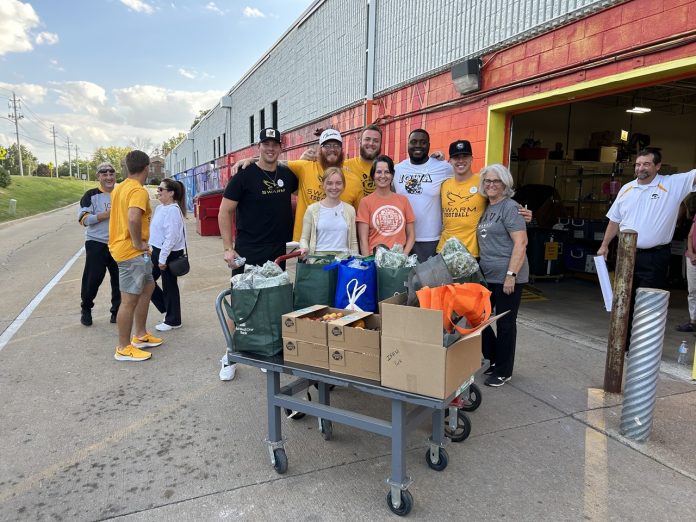
Iowa’s local food network is facing an uncertain future after the U.S. Department of Agriculture announced that anticipated funding for key farm-to-school and food assistance programs will not be coming.
The USDA’s Agricultural Marketing Service had committed more than $2 billion nationwide to support state and tribal governments through the Local Food for Schools, Local Food Purchasing Assistance, and Local Food for Child Care programs.
Iowa was slated to receive $11.3 million over three years, directing millions in investment to local meat, dairy and produce farmers supplying schools, early childhood centers and food pantries, a release from Iowa Valley RC&D stated.
This funding was expected to build on the $7.8 million already allocated to Iowa since 2022, which has benefited 135 school districts, 300 farms, and 951 food distribution sites across 98 counties.
“If this funding is pulled back, Iowa farm families, small businesses, employees, school districts, and food assistance programs will be hit the hardest,” said Jason Grimm, executive director of Iowa Valley RC&D, in the release. “The market that many farms were preparing for has suddenly dried up, turning their planned investments in livestock, feed, seed, fuel, fertilizer, and equipment into liabilities. Farmers will be forced to cancel scheduled meat locker dates, scramble to reverse pre-orders for essential supplies, or absorb the full financial burden if cancellations aren’t possible.”
Local food hubs will feel impact
The funding also played a critical role in supporting food hubs – organizations that help connect farmers with buyers and streamline local food logistics.
Michelle Kenyon, executive director of Field to Family in Iowa City, said prior to the decision, leadership with the Iowa Department of Agriculture and Land Stewardship had consistently expressed support for continuing these programs and even encouraged expanding local food efforts to include more school districts, early childcare centers and food access agencies. In response, Field to Family had been scaling up staff, infrastructure, and partnerships with producers who have also invested in their operations to meet the anticipated demand.
Ms. Kenyon provided the CBJ a copy of the statement she sent to Field to Family’s partners this morning.
“These programs were an investment in Iowa farmers, our food security and our economy,” she wrote. “Rather than import food into the state, these programs provided the opportunity to purchase food directly from the grower to feed our community. By making this decision, the USDA has sent a message that investments in these programs are not a priority, that Iowa farmers receiving fair pay for the food they grow is not important and we couldn’t disagree more. Investments in farmers and food grown for our communities make us stronger, healthier and resilient.”
USDA confirms terminations
The USDA has confirmed it will uphold existing Iowa LFPA and LFS contracts from 2022. However, the next phase of funding – originally scheduled to begin this fall – has been officially canceled for the Local Food Purchasing Assistance 2025 and Local Food for Schools and Child Care 2025 programs, announced in October 2024. These agreements have been terminated, with no plans for reinstatement, a spokesperson with IDALS said.
“Over the past two months, the Trump Administration has been reviewing all federal spending and programs. It should not come as a surprise that a program announced in October 2024 by executive action, rather than legislatively directed, won’t be continued past its original end date,” said Don McDowell, communications director and public information officer with IDALS.
“Programs designed to forge relationships between farmers, food hubs, food banks, and schools are important to our producers and communities. We will continue to keep our eyes open for future opportunities to grow markets for local farmers and Iowa grown and raised food,” according to a statement IDALS issued to its partners and shared with the CBJ, adding that the department would be sharing additional information as it comes along.
Iowa food pilot program emerges among federal cuts
One alternative program, the Choose Iowa Food Purchasing Program for Schools, is moving forward with $70,000 allocated to schools statewide for local food procurement in the coming year.
“This program is a win for everyone involved. Students are served fresh, locally produced foods. Schools can support and build relationships with Choose Iowa members in their communities. School food service programs create new markets for small and beginning farmers to sell their products, and that helps generate economic activity in rural communities,” said Iowa Secretary of Agriculture Mike Naig in a March 10 release. “I strongly encourage schools around the state to apply for participation in this purchasing program.”
Authorized during the 2024 legislative session, the pilot program is part of Choose Iowa, the state’s branding and marketing effort designed to promote Iowa-grown, raised, and made food, beverages and agricultural products.
According to Choose Iowa’s website, public and private schools can apply for up to $1,000 per school building, with the requirement of a one-to-one financial match.
To participate, schools must purchase food from Choose Iowa members. Schools interested in sourcing from specific Iowa farmers are encouraged to have those producers apply for Choose Iowa membership. Food hubs that are members of the program are also eligible, with the requirement that all purchased products originate from Iowa producers.
The deadline for schools to apply is April 7 at 12 p.m., with applications available through the Choose Iowa website. Participating schools will be announced later this spring.
“While this first-time program is a win, it will not serve as a back-stop for USDA’s over $8M of the $11M for the state earmarked for Farm to School and Early Care food purchases from local farmers,” Iowa Valley RC&D’s release stated.
Ms. Kenyon urged Field to Family’s community partners to continue investing in local foods and said farmers offering community supported agriculture shares are now accepting signups. The organization continues to deliver locally sourced food to schools, restaurants and institutions through its wholesale program.
Those interested in purchasing or signing up for wholesale orders can register at orders.fieldtofamily.org. Supporters can also contribute to Field to Family’s efforts to expand local food access by donating at fieldtofamily.org/donate.




